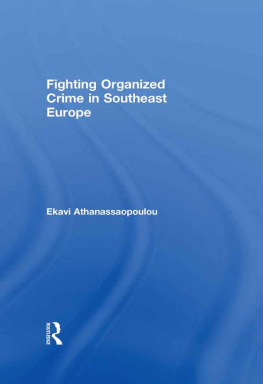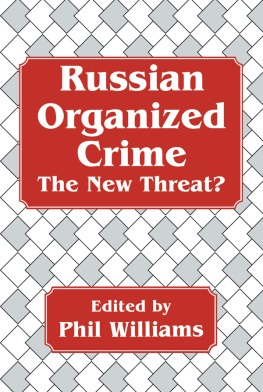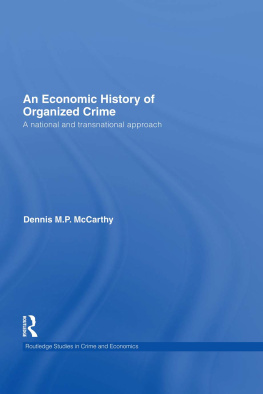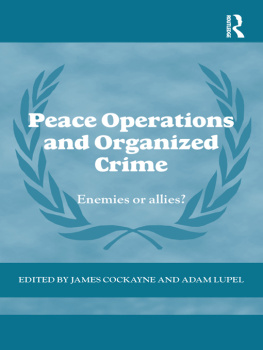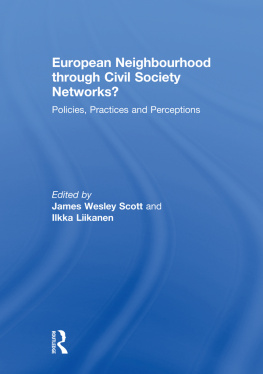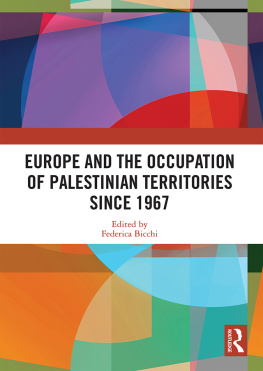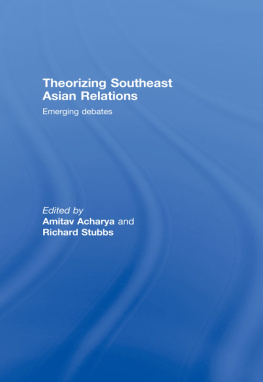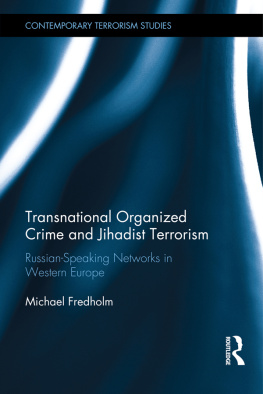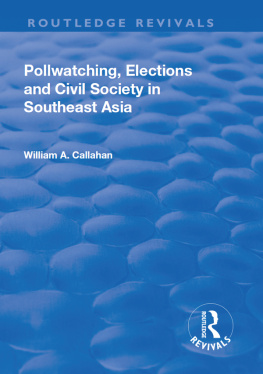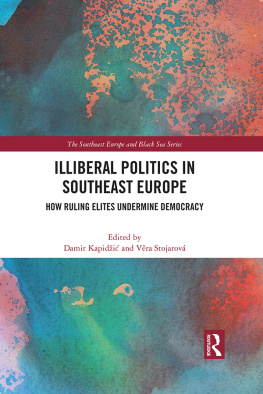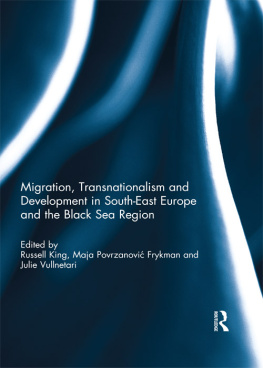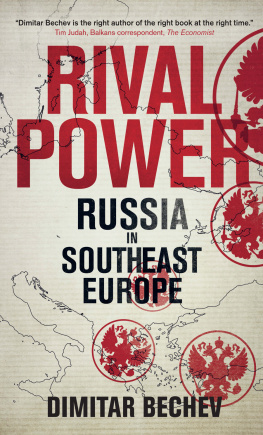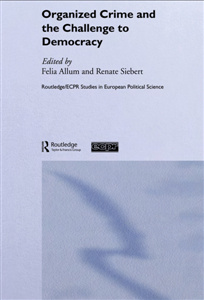Fighting Organized Crime in Southeast Europe
In recent years organized crime has become endemic in the countries of Southeast Europe, and in so doing it has become perhaps the greatest impediment to the development of the area. This book recognizes that we are now involved in an urgent debate into how to successfully tackle it. Drawing together leading academics in the field, this collection of essays makes a thorough and valuable contribution to the debate. The discussions range over national and regional policies, the West European dimension of the phenomenon, and the less often discussed role that the media and civil society can play in the battle against organized crime.
This is a special issue of the Journal of Southeast European and Black Sea Studies.
Ekavi Athanassopoulou is a Senior Research Fellow of the Hellenic Foundation for European and Foreign Policy, Athens.
Fighting Organized Crime in Southeast Europe
Ekavi Athanassopoulou
First published 2005 by Routledge
2 Park Square, Milton Park, Abingdon, Oxon, OX14 4RN
Simultaneously published in the USA and Canada
by Routledge
270 Madison Ave, New York, NY 10016
Routledge is an imprint of the Taylor & Francis Group
2005 Ekavi Athanassopoulou
Typeset in Palatino by Genesis Typesetting Limited, Rochester, Kent
Printed and bound in Great Britain by Antony Rowe Ltd, Chippenham, Wiltshire
All rights reserved. No part of this book may be reprinted or reproduced or utilised in any form or by any electronic, mechanical, or other means, now known or hereafter invented, including photocopying and recording, or in any information storage or retrieval system, without permission in writing from the publishers.
British Library Cataloguing in Publication Data
A catalogue record for this book is available from the British Library
Library of Congress Cataloging in Publication Data
ISBN: 0-415-34801-3
Contents
Fighting Organized Crime
in SEE | Ekavi Athanassopoulou |
Enhancing Cooperation against Transborder
Crime in Southeast Europe: Is There an
Emerging Epistemic Community? | Susan L. Woodward |
Economic Perspectives on Organized
Crime | Krassen Stanchev |
Migration Policies of Western European
Governments and the Fight Against
Organized Crime in SEE | Misha Glenny |
Fighting Organized Crime in a UN
Protectorate: Difficult, Possible, Necessary | Radoslava Stefanova |
Fighting Transborder Organized Crime in
Southeast Europe through Fighting
Corruption in Customs Agencies | Emi Velkova and Saso Georgievski |
Transborder Crime between Turkey and
Greece: Human Smuggling and its
Regional Consequences | Ahmet duygu |
Anti-Corruption and Anti-Organized Crime
Policy in Serbia: Regional Implications | Aleksandar Fati |
The Role of Civil Society in Fighting
Corruption and Organized Crime in
Southeast Europe | Plamen Ralchev |
ELIAMEP'S FORUM ON NEW SECURITY ISSUES (FONSI):
SHARED INTERESTS & VALUES BETWEEN SOUTHEASTERN EUROPE & THE TRANSATLANTIC COMMUNITY |
Workshop on Perceptions Regarding Organized Crime
in Southeastern Europe: Is there an Information Gap?,
2426 June 2003, Athens |
Ekavi Athanassopoulou is Senior Research Fellow at ELIAMEP and Academic Director of ELIAMEP's project forum on New Security Issues: Shared Interests and Values Between Southeastern Europe and the Transantlantic Community, which focuses on organized crime and its interelated activities. Recently (2003) she was Visiting Fellow at the Pacific Council on International Policy, USA. She is the author of Turkey: Anglo-American Security Interests 19451952: The First Enlargement of NATO (1999).
Saso Georgievski is a Professor at the University Cyril and Methodius, Law School, Skopje, Macedonia.
Misha Glenny, during the Yugoslav crisis of the early 1990s, was the Central Europe correspondent for the BBC World Service. He is the author of a number of books, including The Rebirth of History: Eastern Europe in the Age of Democracy, and The Fall of Yugoslavia: The Third Balkan War(1992), The Balkans(1999). He is currently working as a political consultant on southeast Europe and divides his time between London, Brighton and the region.
Aleksandar Fati is a Research Professor of International Relations at the Institute of International Politics and Economics in Belgrade. He directs the Security Policy Group of the Management Centre, a think-tank based in Belgrade. He is the author of numerous publications, including Crime and Social Control in Central-Eastern Europe(1997).
Radoslava Stefanova is officer at NATO's Political Affairs and Security Policy Division. Prior to her current employment she taught International and Transatlantic Relations at the American Universty of Rome and was Research Fellow at Istituto Affari Internazionali(IAI), Rome.
Ahmet duygu, is Associate Professor at the Department of International Relations, Ko University, Sariyer, Istanbul, Turkey.
Krassen Stanchev is one of the founders and Executive Director of the Institute for Market Economics (IME). He served as a member of the Constitutional Assembly of Bulgaria (19901991) and was founder of different civic groups and initiatives, among them the first private university, the New Bulgarian University. In 1996 he was named Best Country Individual Analyst by EuroMoney. In 1995, he was one of the initiators of the Balkan Network (http://www.balkannet-work.org), a group that devoted resources and efforts to study economic peculiarities of the region.
Plamen Ralchev is a policy analyst at the Institute for Regional and International Studies. He has been a visiting fellow with the East Europe Program at the Center for Strategic and International Studies in Washington DC, and a guest lecturer at the National Security and Defence Department at Georgi Rakovski Defence and Staff College, Sofia.
Emi Velkova is a Visiting Scholar at Boston University School of Law.
Susan Woodward is Professor of Political Science at the Graduate Center of the City University of New York. She is the author of Balkan Tragedy: Chaos and Dissolution after the Cold War(1995), Socialist Unemployment: The Political Economy of Yugoslavia, 19451990(1995) and numerous articles on southeast Europe, post-communist transition, state-building and crisis management.
This special issue on Fighting Organized Crime in Southeast Europe is the direct product of ELIAMEP's project, Forum on New Security Issues (FONSI): Shared Interests and Values Between Southeast Europe (SEE) and the Transatlantic Community. In the summer of 2002 ELIAMEP launched this project with the generous support of the German Marshall Fund of the United States. The initiative for this project derived from the understanding that organized crime and its interelated activities has emerged as the most serious security issue in southeast Europe, undermining stability and the rule of law both essential for the gradual integration of the region with the transatlantic community.
Within the framework of this project ELIAMEP organizes two workshops a year, seeking thus to establish a regular forum for dialogue and for building mutual understanding and a consensus of approach between influential actors from the United States, the EU and southeast Europe regarding organized crime, terrorism and other non-traditional, interrelated security challenges in the region.

